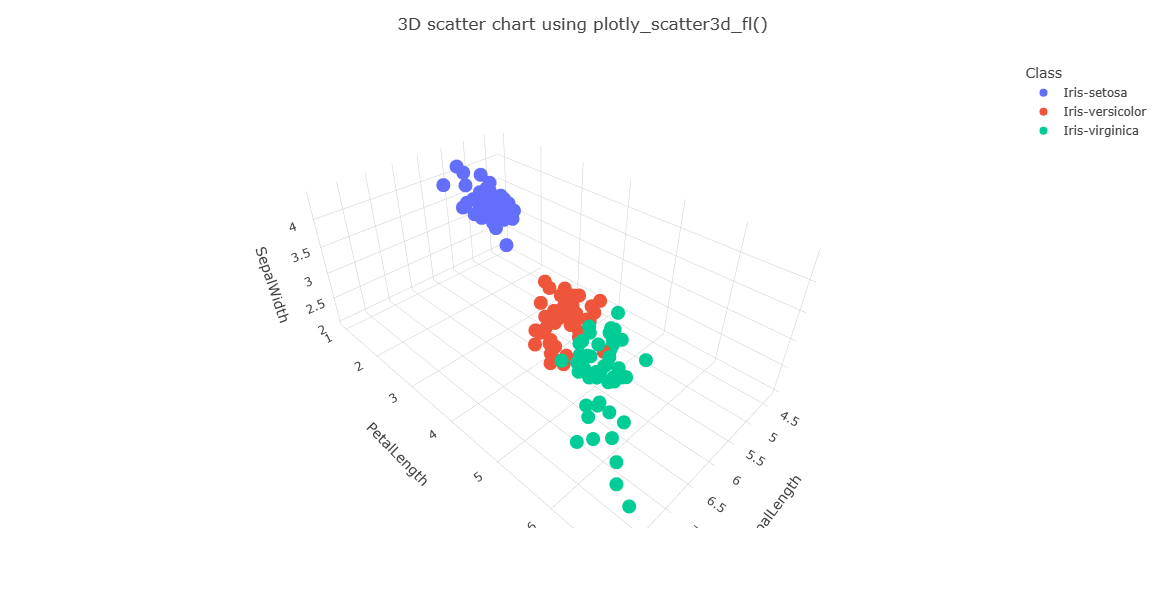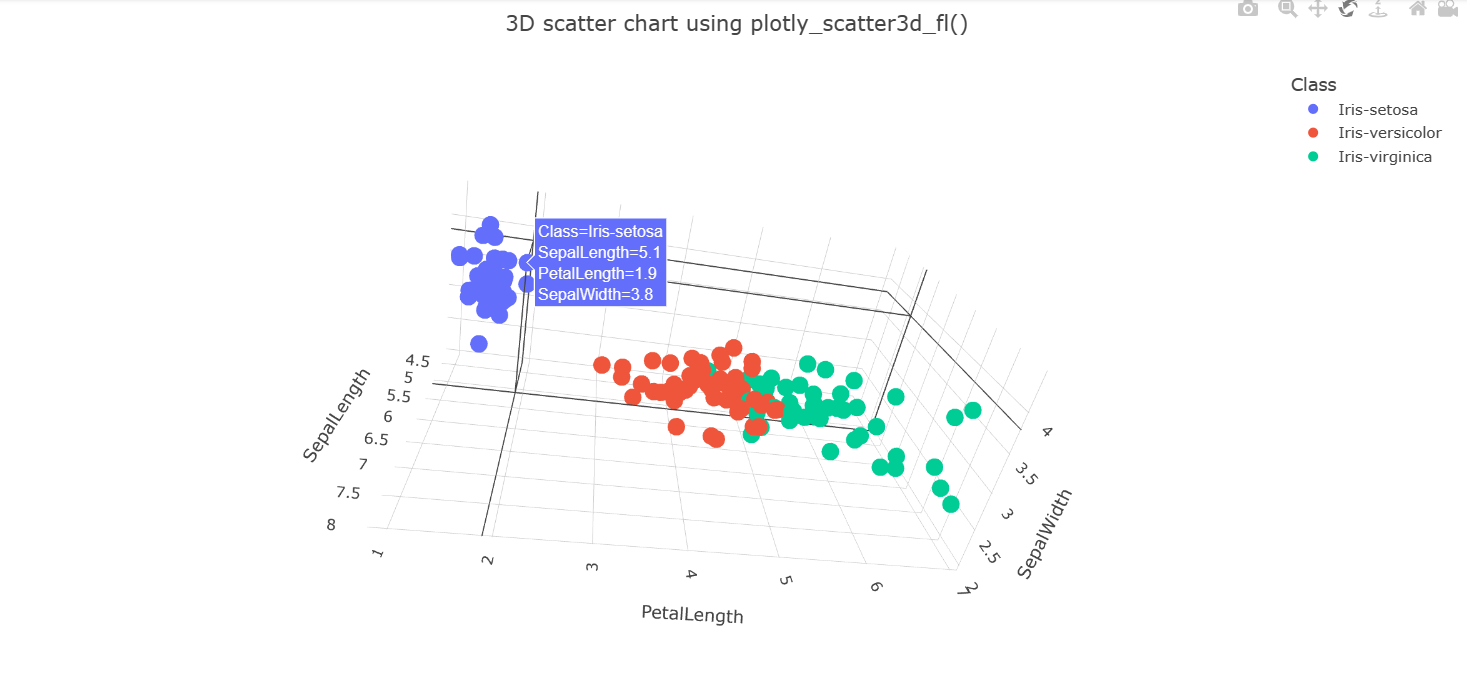plotly_scatter3d_fl()
적용 대상: ✅Microsoft Fabric✅Azure Data Explorer✅Azure Monitor✅Microsoft Sentinel
이 함수 plotly_scatter3d_fl() 는 대화형 3D 분산형 차트를 만들기 위해 플롯 템플릿을 사용자 지정할 수 있는 UDF(사용자 정의 함수)입니다.
함수는 렌더링할 레코드, x, y, z 및 집계 열의 이름 및 차트 제목 문자열이 포함된 테이블을 허용합니다. 함수는 플롯 JSON을 포함하는 단일 셀 테이블을 반환합니다. 필요에 따라 Azure Data Explorer 대시보드 타일에서 데이터를 렌더링할 수 있습니다. 자세한 내용은 Plotly(미리 보기)를 참조하세요.
함수는 렌더링할 레코드, x, y, z 및 집계 열의 이름 및 차트 제목 문자열이 포함된 테이블을 허용합니다. 함수는 플롯 JSON을 포함하는 단일 셀 테이블을 반환합니다. 필요에 따라 실시간 대시보드 타일에서 데이터를 렌더링할 수 있습니다. 자세한 내용은 Plotly(미리 보기)를 참조하세요.
전제 조건
공개적으로 사용 가능한 PlotlyTemplate 테이블에서 필요한 'scatter3d' 템플릿을 추출합니다. 대상 데이터베이스에서 다음 KQL 명령을 실행하여 샘플 데이터베이스에서 데이터베이스로 이 테이블을 복사합니다.
.set PlotlyTemplate <| cluster('help.kusto.windows.net').database('Samples').PlotlyTemplate
구문
T | invoke plotly_scatter3d_fl(, x_col y_col, z_col aggr_col , [, chart_title ])
구문 규칙에 대해 자세히 알아봅니다.
매개 변수
| 이름 | Type | 필수 | 설명 |
|---|---|---|---|
| x_col | string |
✔️ | 3D 플롯에서 조정된 X 열의 이름입니다. |
| y_col | string |
✔️ | 3D 플롯의 조정된 Y 열 이름입니다. |
| z_col | string |
✔️ | 3D 플롯에서 조정된 Z 열의 이름입니다. |
| aggr_col | string |
✔️ | 그룹화 열의 이름입니다. 동일한 그룹의 레코드는 고유한 색으로 렌더링됩니다. |
| chart_title | string |
차트 제목입니다. 기본값은 '3D 분산형 차트'입니다. |
함수 정의
다음과 같이 해당 코드를 쿼리 정의 함수로 포함하거나 데이터베이스에 저장된 함수로 만들어 함수를 정의할 수 있습니다.
다음 let 문을 사용하여 함수를 정의합니다. 사용 권한이 필요 없습니다.
Important
let 문은 자체적으로 실행할 수 없습니다. 그 뒤에 테이블 형식 식 문이 있어야 합니다. 작업 예제 plotly_scatter3d_fl()를 실행하려면 예제를 참조 하세요.
let plotly_scatter3d_fl=(tbl:(*), x_col:string, y_col:string, z_col:string, aggr_col:string='', chart_title:string='3D Scatter chart')
{
let scatter3d_chart = toscalar(PlotlyTemplate | where name == "scatter3d" | project plotly);
let tbl_ex = tbl | extend _x = column_ifexists(x_col, 0.0), _y = column_ifexists(y_col, 0.0), _z = column_ifexists(z_col, 0.0), _aggr = column_ifexists(aggr_col, 'ALL');
tbl_ex
| serialize
| summarize _x=pack_array(make_list(_x)), _y=pack_array(make_list(_y)), _z=pack_array(make_list(_z)) by _aggr
| summarize _aggr=make_list(_aggr), _x=make_list(_x), _y=make_list(_y), _z=make_list(_z)
| extend plotly = scatter3d_chart
| extend plotly=replace_string(plotly, '$CLASS1$', tostring(_aggr[0]))
| extend plotly=replace_string(plotly, '$CLASS2$', tostring(_aggr[1]))
| extend plotly=replace_string(plotly, '$CLASS3$', tostring(_aggr[2]))
| extend plotly=replace_string(plotly, '$X_NAME$', x_col)
| extend plotly=replace_string(plotly, '$Y_NAME$', y_col)
| extend plotly=replace_string(plotly, '$Z_NAME$', z_col)
| extend plotly=replace_string(plotly, '$CLASS1_X$', tostring(_x[0]))
| extend plotly=replace_string(plotly, '$CLASS1_Y$', tostring(_y[0]))
| extend plotly=replace_string(plotly, '$CLASS1_Z$', tostring(_z[0]))
| extend plotly=replace_string(plotly, '$CLASS2_X$', tostring(_x[1]))
| extend plotly=replace_string(plotly, '$CLASS2_Y$', tostring(_y[1]))
| extend plotly=replace_string(plotly, '$CLASS2_Z$', tostring(_z[1]))
| extend plotly=replace_string(plotly, '$CLASS3_X$', tostring(_x[2]))
| extend plotly=replace_string(plotly, '$CLASS3_Y$', tostring(_y[2]))
| extend plotly=replace_string(plotly, '$CLASS3_Z$', tostring(_z[2]))
| extend plotly=replace_string(plotly, '$TITLE$', chart_title)
| project plotly
};
// Write your query to use your function here.
예시
다음 예제에서는 호출 연산자를 사용하여 함수를 실행합니다.
쿼리 정의 함수를 사용하려면 포함된 함수 정의 후에 호출합니다.
let plotly_scatter3d_fl=(tbl:(*), x_col:string, y_col:string, z_col:string, aggr_col:string='', chart_title:string='3D Scatter chart')
{
let scatter3d_chart = toscalar(PlotlyTemplate | where name == "scatter3d" | project plotly);
let tbl_ex = tbl | extend _x = column_ifexists(x_col, 0.0), _y = column_ifexists(y_col, 0.0), _z = column_ifexists(z_col, 0.0), _aggr = column_ifexists(aggr_col, 'ALL');
tbl_ex
| serialize
| summarize _x=pack_array(make_list(_x)), _y=pack_array(make_list(_y)), _z=pack_array(make_list(_z)) by _aggr
| summarize _aggr=make_list(_aggr), _x=make_list(_x), _y=make_list(_y), _z=make_list(_z)
| extend plotly = scatter3d_chart
| extend plotly=replace_string(plotly, '$CLASS1$', tostring(_aggr[0]))
| extend plotly=replace_string(plotly, '$CLASS2$', tostring(_aggr[1]))
| extend plotly=replace_string(plotly, '$CLASS3$', tostring(_aggr[2]))
| extend plotly=replace_string(plotly, '$X_NAME$', x_col)
| extend plotly=replace_string(plotly, '$Y_NAME$', y_col)
| extend plotly=replace_string(plotly, '$Z_NAME$', z_col)
| extend plotly=replace_string(plotly, '$CLASS1_X$', tostring(_x[0]))
| extend plotly=replace_string(plotly, '$CLASS1_Y$', tostring(_y[0]))
| extend plotly=replace_string(plotly, '$CLASS1_Z$', tostring(_z[0]))
| extend plotly=replace_string(plotly, '$CLASS2_X$', tostring(_x[1]))
| extend plotly=replace_string(plotly, '$CLASS2_Y$', tostring(_y[1]))
| extend plotly=replace_string(plotly, '$CLASS2_Z$', tostring(_z[1]))
| extend plotly=replace_string(plotly, '$CLASS3_X$', tostring(_x[2]))
| extend plotly=replace_string(plotly, '$CLASS3_Y$', tostring(_y[2]))
| extend plotly=replace_string(plotly, '$CLASS3_Z$', tostring(_z[2]))
| extend plotly=replace_string(plotly, '$TITLE$', chart_title)
| project plotly
};
Iris
| invoke plotly_scatter3d_fl(x_col='SepalLength', y_col='PetalLength', z_col='SepalWidth', aggr_col='Class', chart_title='3D scatter chart using plotly_scatter3d_fl()')
| render plotly
출력
출력은 Azure Data Explorer 대시보드 타일에서 렌더링할 수 있는 Plotly JSON 문자열입니다. 대시보드 타일을 만드는 방법에 대한 자세한 내용은 Azure Data Explorer 대시보드를 사용하여 데이터 시각화를 참조 하세요.
출력은 실시간 대시보드 타일에서 렌더링할 수 있는 Plotly JSON 문자열입니다. 대시보드 타일을 만드는 방법에 대한 자세한 내용은 실시간 대시보드를 참조 하세요.

특정 레코드를 회전, 확대/축소 및 마우스로 가리킬 수 있습니다.
